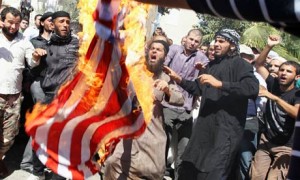Outrage in Muslim world
Anti-Islamic movie “Innocence of Muslims” has sparked global protests and outrage in the Muslim world. Many countries of the world have condemned the documentary made by a California-based Israeli filmmaker including Saudi Arabia and Turkey that have also condemned the killing of United States envoy and three other embassy staff in Benghazi describing it unfortunate. But the uprising in Libya and in Cairo, where the US mission was attacked and flag set on fire, just goes on to establish that religion and region are quite sensitive issues.
The film producer and his associates should be tried for hate crime and for hurting the feelings of the Muslims that make 20 percent of the world population, and should not be allowed to indulge in sacrilege on the premise of freedom of thought and expression. In 2006, the vandalism that the world had witnessed under the guise of free Press from biased cartoonists in Denmark and Sweden was enough to act as an eye-opener.
Detractors of Islam should have know as to what sort of reaction would come from Muslim fraternity if they tried to denigrate prophet of Islam. It appears that from time to time Americans and Europeans are trying to test the Muslims’ devotion to and reverence for the Holy Prophet Muhammad (PBUH), and every time they get the message that all Muslims hold him in the highest esteem and with the same zeal and fervor. In February 2006, there was outrage in the entire Muslim world over dastardly act of the Danish newspaper and its motivated reproduction by others in France, Italy, the Netherlands and Norway. The West claims to be upholder of fundamental rights; it preaches tolerance and respect for others’ faiths, but in practice they do things that tend to inflame the sentiments of the Muslims. And when the latter retaliate, they dub them as extremists and terrorists. According to Foreign Policy magazine’s report, Washington said that it was deploying forces to cope with violence in as many as 18 different locations as deadly anger spreads over US-made blasphemous movie. But the US has already its bases in many countries of the world, therefore it does not make sense that the US would deploy more forces or marines to safeguard its embassies and staff in more than 192 countries.
What US should understand is that the Middle East, in the aftermath of Arab Spring, is too ticklish to stand such upheavals. Respective governments and community leaders have to rise to the occasion to subside undercurrents of hatred and bias. Unfortunately, Muslim countries are divided over fiqah and the US and other big powers take advantage of those contradictions. There is demand that the OIC should convene summit meeting to chalk out a plan to pressurize the US and western countries to stop the hate campaign against Muslims. But Muslim countries are playing in the hands of the super power, which was obvious when they threw Syria out of the OIC’s fold in the third extraordinary summit conference of the Organisation of Islamic Cooperation held at the holy city of Makkah recently.
The two-day summit moot, chaired by custodian of the Two Holy Mosques King Abdullah bin Abdul Aziz, ended with a clear polarization within the 57-member body of Islamic states. Syria was suspended from the Arab League last year over its clampdown on the uprising that President Bashar Assad characterized as a plot by Western and rival powers to overthrow his regime.
The UN Secretary General Ban ki-Moon had appointed former secretary-general Kofi Annan as his special envoy to find a Syrian solution but the attempt failed despite Annan’s visits to Damascus to hold talks with Syrian leadership during the last six months. In August, former Foreign Minister of Algeria Lakhdar Brahimi was assigned the task of resolving the Syrian issue. But so far all the bids to resolve the crisis failed after talks with President Assad. But the OIC suspended Damascus without hearing Syrian point of view. This is, therefore, a major anomaly in the Makkah Declaration. Since the OIC also faltered in calling for non-intervention by foreign forces in Syria, this has added to the impact of the jarring decision. As regards Kashmir dispute, the OIC had been issuing statements to resolve the issue on the basis of UN resolutions, but for quite some time it is also parroting the American and Indian stance that it should be resolved through bilateral negotiations knowing full well that for the last 63 years, India has balked on serious dialogue on the core issue of Kashmir.
America and European countries have been eulogizing the Arab Spring in Muslim countries. Though there were uprisings in Egypt, Tunisia, Yemen and Libya, yet they deemed it appropriate only to supply weapons and provide funds to the rebels in Libya. As to the unrest in Middle East and North Africa, after Libya now Syria is the target. Muslim countries have to understand that if they do not show unity they will be taken on one by one. In latest issue of the Time, the author Bobby Ghosh in his article on the violence in the wake of controversial film stated that a chain of violence from Cairo to Benghazi raises the question whether the Arab Spring makes the Middle East more dangerous? He also wrote: “Before Arab Spring, this chain of events would likely have been stopped early.
Dictators like Egypt’s Hosnie Mubarak and Libya’s Gaddafi would have either blocked Internet access to prevent their people from seeing inflammatory material (among other things) or used their security agencies to crack down on protests long before they could reach critical mass”. One can conclude from such remarks that Americans have the penchant to support the dictators because they do not like the hassle of dealing with the cabinets and parliaments. In the past also they ditched the dictators only after they had become unpopular because of the policies dictated by the US.
(Mohammad Jamil)






